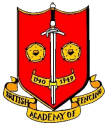Dame Mary Glen-Haig was born as Mary Alison James on 12 July 1918 in London. Her father, William James, fenced at the 1908 Summer Olympics in London and it was from him that she developed her interest in the sport.
In the course of a competitive career which ran from 1937 to 1959, Mary competed at regional and world level, bringing home the individual gold medal for Women’s Foil in both the 1950 and 1954 British Empire Games (now the Commonwealth Games) and qualified for the 1948 Olympic Games in London, where she came 8th. Following this, she again competed at the 1952, 1956 and 1960 Olympic Games in individual Women’s Foil and in 1960 in the Team event.
What makes this more remarkable, is that Mary combined all this with a successful medical career, first as an administrator at Kings College Hospital and then from 1974 to 1982 as hospital district administrator in West Kensington.
In addition to this she was fencing representative for the NOC (1948); member of the Executive Committee of the NOC (1970s); President of the Ladies’ Amateur Fencing Union (1964-1973); President of the Amateur Fencing Association (1973-1986); Honorary President of the British Fencing Association (1986); British representative to the International Fencing Federation (FIE) (1972-1986); FIE Honoured Member (1999); Chairman of the British Olympic Association Medical Trust (1989-1993); Chairman of the Central Council of Physical Recreation (1975-1981) then Vice-President (1982); member of the British Sports Council (1966-1982); President of the British Sports Association for the Disabled (1981-1991) then Honorary Life President (1991) and Founder member and Vice-President of the Sports Aid Foundation. In 1982, she was made the first female member of the International Olympic Committee.
She was also an honorary member of the BAF and was appointed a Member of the Order of the British Empire (MBE) in the 1971 Queen’s Birthday Honours, promoted to Commander (CBE) in the 1977 New Year Honours, and Dame Commander (DBE) in the 1993 New Year Honours. She served as the ambassador from Britain to the 2012 Summer Olympics, which was held in London.
Mary was one of the most forthright and intimidating people I have ever met and she didn’t suffer fools lightly. And yet she had fencing in her blood. During the mid 70s I organised a fencing conference in the North West and invited Mary (then President of AFA) to be our guest of honour. Not only did she accept, she insisted on paying all her own expenses.
During that same period, I invited her to a beginner’s competition, in Manchester and again she insisted on paying her own expenses. She arrived just after the first round then spent all day talking to and encouraging the fencers. She insisted on presiding the final (which, in those days was still steam) and did so in her usual and inimitable way, letting the judges know exactly where the stood if they didn’t agree with her.
Mary was a good friend and a great ally, and she provided me with any enormous amount of help, support and advice in helping secure and organise the 1990 Commonwealth Federation Fencing Championship which was held as a part of Manchester bid to stage the 1996 Olympic Games.
Mary died on November 15th 2014 and will be deeply missed by those who knew her. IOC President Thomas Bach says of her: “Dame Mary Alison Glen-Haig lived a life full of passion for sport and was a pioneer in many respects. Her skills on the sports field, as well as in the medical field, combined with her warm personality, made her unique. She was a true inspiration.”
The fencing world and each and every fencer in Britain has lost one of is hardest working and best supporters of our sport and she will be sadly missed.
Prof. Philip Bruce
